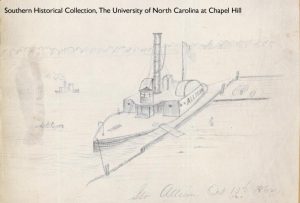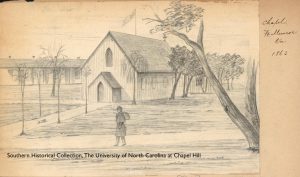[Our final installment of our “welcome back” series.]
Ah, it’s a phenomenon old as time: college-age sons and daughters contacting home to ask for more money. The following letter was sent from James Johnston Pettigrew to his father Ebenezer Pettigrew on 8 February 1846. J.J. needed some money for some new duds. (This letter comes from the Pettigrew Family Papers, SHC #592):

Although it is early in the session, I presume it will not be out of place to make a statement of the clothes I shall want, more especially since my wardrobe is nearly exhausted. The present underclothes are the ones I had when I left Hillsboro [sic], with the exception of four bosoms and collars, which I bought two years ago. Most of these, that is to say, shirts, drawers, stockings, collars, handkerchiefs, & cravats, are either worn out or have become too small. The same is the case with my outer clothes, with the exception the two pairs of pantaloons, which were purchased at Raleigh last summer, and are bothe [sic] too small by this time. In the article of shirts, I am almost certainly deficient. My present cap has lasted two winters, and Sister Mary can inform you with regard to its shabby appearance during the vacation. This I mention, merely to show, that I am not diposed to be extravagant in my dress. The following is a list which I have made out of my probable wants. I have only one coat for this winter, so that it will be better to get another for Commencement.
- One Coat.
- One pair of Pantaloons.
- Two vests. (I am entirely out of vests, also.)
- One hat.
- Shirts.
- Drawers.
- Stockings.
- Two or three handkerchiefs.
- One or two cravats.
- Shoes.
There is in addition to these another want, which may appear trifling, but which in my situation is absolutely necessary as a Marshal for Commencement, namely, a cane. Judging the price of these articles from my clothes last summer and the summers before, the amount will probably be $70 or $80, a very large sum, but I do not see how it is to be avoided, without an appearance which I wouldn’t wish to show.

![(detail) William Bagley to Mose G. Pierce, from William Bagley Letter Books, SHC #863-z. [detail] William Bagley to Mose G. Pierce (from William Bagley Letter Books, SHC #863-z)](https://blogs.lib.unc.edu/shc/wp-content/uploads/sites/10/2009/08/images-012-300x206.jpg)







